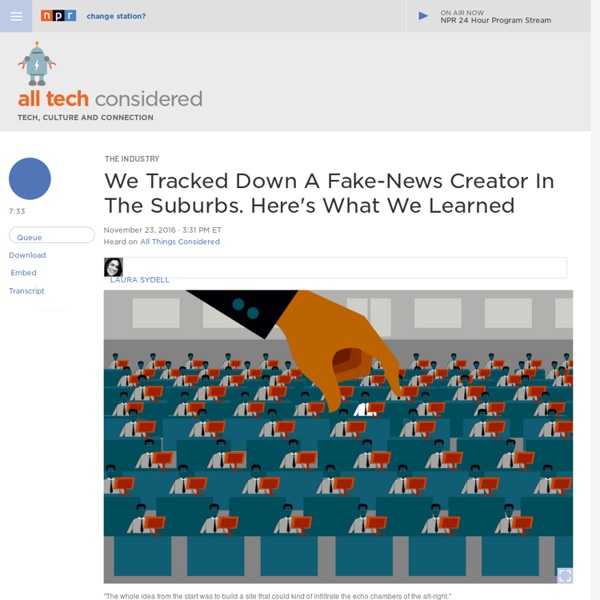We Tracked Down A Fake-News Creator In The Suburbs. Here's What We Learned : All Tech Considered

Oxford Dictionaries Word of the Year 2016 is... | Oxford Dictionaries
post-truth adjective Relating to or denoting circumstances in which objective facts are less influential in shaping public opinion than appeals to emotion and personal belief. 16 November 2016, Oxford, UK: Today, Oxford Dictionaries announces post-truth as its 2016 international Word of the Year. The Oxford Dictionaries Word of the Year is a word or expression chosen to reflect the passing year in language. Every year, the Oxford Dictionaries team reviews candidates for word of the year and then debates their merits, choosing one that captures the ethos, mood, or preoccupations of that particular year. The concept of post-truth has been in existence for the past decade, but Oxford Dictionaries has seen a spike in frequency this year in the context of the EU referendum in the United Kingdom and the presidential election in the United States. The compound word post-truth exemplifies an expansion in the meaning of the prefix post- that has become increasingly prominent in recent years.
Head Transplant Patient Will Use VR - Real or Fake?
Last year, Italian neuroscientist Dr. Sergio Canavero shocked the medical establishment when he announced that he would be able to transplant a human head onto a new body by 2017. He even gave a high-energy Tedx talk about the surgery. But the project was greeted with skepticism. The medical community has called the project junk science, reports Sam Kean at The Atlantic—one doctor even suggested that those involved should be charged with murder if it fails. The other big problem—besides the almost insurmountable technical details and the $10 to $100 million price tag—is that transplanting a head onto a new body could be a recipe for confusion and madness. Arthur Caplan, director of medical ethics at New York University’s Langone Medical Centre, who is a vocal Canavero critic, tells Christoper Hooten at The Independent that head transplant patients “would end up being overwhelmed with different pathways and chemistry than they are used to and they’d go crazy.”
researchers find students have trouble judging the credibility of information online
When it comes to evaluating information that flows across social channels or pops up in a Google search, young and otherwise digital-savvy students can easily be duped, finds a new report from researchers at Stanford Graduate School of Education. The report, released this week by the Stanford History Education Group (SHEG), shows a dismaying inability by students to reason about information they see on the Internet, the authors said. Students, for example, had a hard time distinguishing advertisements from news articles or identifying where information came from. "Many people assume that because young people are fluent in social media they are equally perceptive about what they find there," said Professor Sam Wineburg, the lead author of the report and founder of SHEG. "Our work shows the opposite to be true." The researchers began their work in January 2015, well before the most recent debates over fake news and its influence on the presidential election.
Visual and Media Literacy for Deeper Learning
The Venting Just recently I was talking with a colleague at an education conference. We discussed how to create and develop better ways to engage students in reading at the intermediate level. At the end of the conversation she asked if I would be willing to conduct a literacy workshop for teachers after school hours. My Goals for Professional Development My goals for the workshop were to: Define visual and media literacyDemonstrate how to use media to teach inference, make judgments, and develop conclusions While leading this workshop was not an expectation of the district or the library services department, it was an honor to present to literacy guidance to these teachers and I was excited about the workshop. It was important for me to share with teachers how much media is consumed among our students. Who Am I? As an introduction to the workshop I clipped pictures of people, places, animals, and symbols from various magazines, old picture books, and the Creative Commons website. References
Related:



